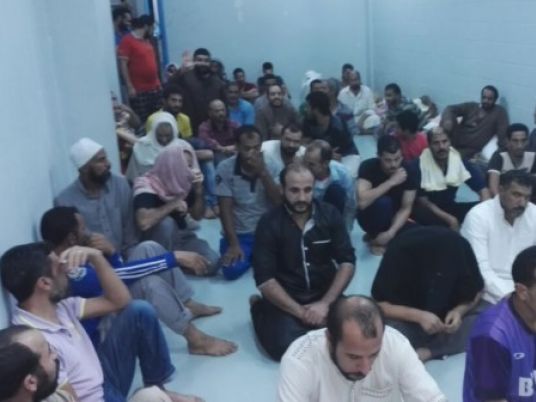
Egyptian citizens detained on in Al-Shumaisi Deportation Complex in Saudi Arabia — mostly on charges related to visas and labor-law violations — have released videos showing the conditions in which they are kept, demanding their repatriation.
The videos were sent to Al-Masry Al-Youm's citizen-journalism page on Tuesday night, spreading quickly on social media, reviving the ongoing controversy about Egyptians detained indefinitely in Saudi jails for minor infractions. Many online viewers responded by calling on the Egyptian government to negotiate the quick release of those held in such conditions.
The videos, which were sent through a Whatsapp Messenger account for the citizen-journalism section, depict several prisoners in a cell banging on a locked door and chanting, “We want to go home! We want to go home!”
Among the images released was a man who had apparently collapsed due to weakness resulting from a hunger strike.
Saudi Arabia insists that foreign workers violating visa rules and labor laws — including those who attempt the Haj without the necessary visa — must pay a fine before being repatriated. However, many of those convicted say they cannot afford to pay the fines imposed by Saudi courts. They are then held indefinitely as a punishment, with no indication of when they will be allowed to return home — if ever.
The situation has been rumbling on for several years, emerging into the media spot light occasionally, reviving calls for a change in Saudi practices. Earlier this month, Egypt's Foreign Ministry said it has been following the situation closely and is seeking to secure the return of those Egyptians being held.
In 2013, Saudi Arabia started enforcing a new law whereby no foreign national can work independently in the country. Rather, they have to be associated with a sponsor who must be a Saudi national.
Critics have said the new law results in terrible working conditions for foreign workers, often due to the fact that Saudi employees have the right to hold on to the travel documents of foreign workers for the duration of their stay. Workers have reported being denied permission to travel home for holidays, while wages are often withheld and additional sums extracted on the pretext of visa renewals. Others have complained of suffering physical abuse at the hands of their Saudi sponsors.
There are almost one million Egyptians working in Saudi Arabia, making up around 40 percent of the labor force.
For foreign workers, however, the problems often result from obtaining work papers through informal means. Large numbers are arrested each year for being employed illegally through employment agencies that are not registered with the government. Others, meanwhile, are detained for attempting a Muslim pilgrimage without the proper permission.
Those found to be in the country illegally are fined up to 10,000 riyals and detained until deportation.
However, critics of the Saudi system say that many foreign workers — particularly Egyptians — cannot afford to pay the fine, and are then kept in jail indefinitely, with no indication of when they will be released.
ُEarlier this month, the People's Democratic Party in Egypt publicly requested President Abdel Fattah al-Sisi to bring the detainees home. In a press statement, the head of the party, Imam Hassan Aly, blamed the Egyptian Embassy in Saudi Arabia for not carrying out its duty, which is ensuring the safety of Egyptian citizens in the country.
The detainees announced that they are now on a hunger strike because they are not getting any assistance from Egyptian officials. The videos released on Tuesday seems to show one of the detainees fainting from hunger.
Images allegedly showing an Egyptian man fainting during a hunger strike in a Saudi detention center
The anonymous sender of the videos said, “We had no choice but to go on hunger strike. We have failed in getting out, and every time we are visited by an Egyptian official, they leave us and don’t do anything. Where is our country?"
He explains that the situation of the detained Egyptians is worse than that of other nationalities, many of whom are released relatively quickly after being jailed.
"The Filipino prisoners were sent back to their homeland, so were the Indian prisoners. Their countries were there for them. There were many other nationalities also that were sent back to their countries,” he explained.
More than 1,000 prisoners are kept in Saudi detention centers under such conditions, he explained, their cries for help unanswered.
“We are detained either because we went on Haj without a visa, or we were working with employment offices that are not registered with the government and so we aren't sponsored. There are fines we could pay to be released, but they are very high and we can’t afford it," said one prisoner.
"For those working illegally in Saudi, the fine is 10,000 Saudi riyals plus some minor jail time, and for going on Haj without a visa, the fine is also 10,000 Saudi riyals plus a month of jail time. How are we supposed to pay that when we are here working or going on Haj and all our belongings and assets are back in Egypt?" he complains.
Earlier this month, the Egyptian Consulate in Saudi Arabia announced that they are monitoring the situation of the detainees at Al-Shumaisi closely. A team from the consulate visits the detainees on a daily basis, aiming to facilitate their return to Egypt, it said.
The Consulate has since urged Egyptians visiting Saudi Arabia to arrange the proper permissions and visas ahead of time.
